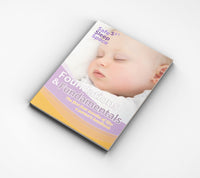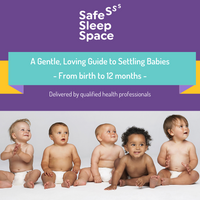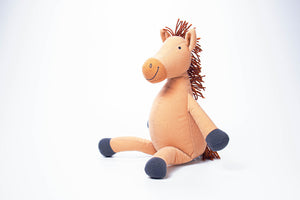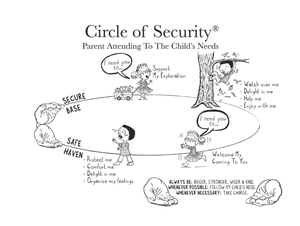Night weaning and phasing out night feeds

Most of us can cope with intensely busy days if, we have the chance to rest and recuperate with sleep at night. For parents, having a young baby to care for always means some adjustment in their own sleep, especially in the early months of their baby’s life.
Babies are biologically adapted to need feeding around the clock – both day and night, to support their healthy growth and development. There does, however, come a magical point in time when babies are old enough and developmentally ready to stop needing to be fed overnight.
When will my baby not need feeding overnight?
There is no one golden age when babies don’t need overnight feeds, when they stop is unique for every baby. However, from around seven to ten months on, most healthy, well fed and thriving babies are ready to drop down to at least one and possibly no feeds overnight. This is more common for bottle fed babies, though for breastfed babies, dropping night feeds tends not to happen before 12 months of age.
Some babies don’t need any persuasion to sleep for longer periods overnight, others need a little help.
Overnight feeding basics
For a young baby, feeding at night is not just about nutrition. They gain comfort, reassurance and security in knowing that if they cry, they will be responded to.
If your baby is getting towards 12 months of age and you feel they’re sucking more for comfort rather than needing to feed overnight, it may be useful to consider other ways of soothing them.
Some babies will be so distractable with their day time feeding that they ‘make up’ for feeds overnight when they’re sleepy. One way to fix this is to reduce overnight feeds so the baby is hungrier for feeds in the day.
Babies who go to sleep when they’re feeding and are transferred already asleep into their cot, don’t learn skills in self-settling. Often, night feeding for older babies is related to sleep and settling associations.
Breastfed babies will often continue to wake for overnight feeds beyond seven months of age. Bottle fed babies can start to have their night feeds phased out from around six months of age. This is because formula is more slowly digested than breast milk.
Offering more feeds in the 12 hours between 6 am- 6 pm can support longer overnight sleeps.
There are often benefits in using a good quality disposable nappy on babies overnight. This helps to reduce the risk of waking overnight due to being wet and uncomfortable and then wanting to be fed.
Babies can also wake overnight because they’re thirsty, rather than hungry. This is often the case for babies who have started eating solids and are digesting food as well as milk. One way to address this is to offer a drink of water from a sippy cup if your baby is older than six months and has already had a breast or bottle feed and has woken.
Ways to phase out night feeds
You have choices about what you can do to stop night feeding. Generally, the best approach is to gradually decrease the frequency and number of overnight feeds.
Every couple of nights, drop one feed so that over a week or more, your baby is not feeding at all, or just feeding once.
If you’re breastfeeding
- Be realistic about your baby’s needs for overnight breastfeeds. If they’re less than six months, they’ll be too young to last for more than around 5-6 hours without a breastfeed.
- Check your supply is fine and adequate for your baby’s needs. Six or more pale/wet nappies in 24 hours, golden yellow/soft poos and a steady weight gain are signs of good milk intake.
- Offer both breasts at day and evening feeds, as well as overnight. Sometimes overnight feeding frequency is related to not getting enough breast milk through the day. An easy way to fix this is to routinely offer both breasts at all, or most feeds.
- Try not to breastfeed your baby straight away when they wake overnight and have been fed in the last couple of hours. Instead, try some settling strategies first with patting/shshing and soothing, rather than breastfeeding as a first response.
- As babies get older, their sleep patterns change. They begin to sleep less during the day and for longer, continuous hours at night. It’s common for babies of six months and older to have up to six hours of sleep overnight without needing to be fed. Follow your baby’s lead, during times of growth, illness and developmental change, they’re likely to want to feed more often, both day and night.
- Expect your breasts to take a week or so to adjust to not feeding overnight. Express for comfort if you need to, but be careful not to express your breasts completely, otherwise you’ll continue to make the same amount of breast milk.
- Consider offering a dream feed if your baby routinely wakes for a feed before midnight.
If you’re bottle feeding
- Offer your baby their milk quota which is based on their age and weight, see below. *
- Make sure you’re preparing the formula exactly as recommended. Formula which is not strong enough won’t be satisfying and support longer sleeps.
- If your baby is fussing and not feeding well during the day, reoffer their bottle after a short break. Formula can be reheated once but throw away any leftover formula which isn’t used within one hour.
- Check the teat flow is right for your baby. Teats which are too slow can mean a lot of energy goes into sucking with little reward. The ideal bottle-feeding time is around 20-30 minutes.
*Approximate formula requirements for babies
|
Days 1-4 |
Start at 30-60 mls/kg/day and increase over the next few day |
|
Day 5 to 3 months
|
150 ml/kg/day |
|
3- 6 months
|
120 ml/kg/day |
|
6-12 months |
100 ml/kg/day |
10 overnight feeding tips for both breast and bottle-fed babies
- Make sure your baby is having solids from around six months of age.
- Make sure your baby feeds well before they settle at night. If they have only partially fed, they’re likely to wake more frequently overnight.
- You could ask your partner to resettle the baby at night. If your baby associates you with feeding, they may be more resistant to resettling overnight without a feed.
- Ask your Child Health Nurse how your baby is tracking on their percentile (growth) charts. Babies who aren’t feeding well don’t sleep well.
- Offer your baby protein and iron-based foods at lunch and dinner time. This will help them to feel fuller for longer.
- Up until your baby is nine months of age, offer them milk first (breast or bottle) then solids. After nine months, you can reverse this order.
- If your baby is sick or growing through a new developmental stage, they may need to be fed more often. It’s fair and kind to offer a milk feed overnight if your baby isn’t feeling well.
- Consider if your baby is having plenty of feeds in the day/evening to sustain longer breaks overnight.
- If your baby’s nappy feels wet and dense, change them overnight when you feed them. This can make a big difference to comfort.
- Try to decide if your baby is really hungry, or they’re just waking for reassurance and comfort.
One more tip about overnight feeding
Babies who aren’t thriving or gaining weight may need extra calories with night time feeds. Check with your Child Health Nurse, GP or paediatrician if you’re unsure about your baby’s growth and nutrition.
About the Author:
Written for Safe Sleep Space by Jane Barry. Jane has qualifications in general, paediatric, immunisation, midwifery and child health nursing. She holds a Bachelor Degree in Applied Science (Nursing) and has almost 35 years specialist experience in child health nursing. She is a member of a number of professionally affiliated organisations including AHPRA, The Australasian Medical Writer’s Association and Australian College of Children and Young People’s Nurses.
References
Night weaning & phasing out night feeds | Raising Children Network








